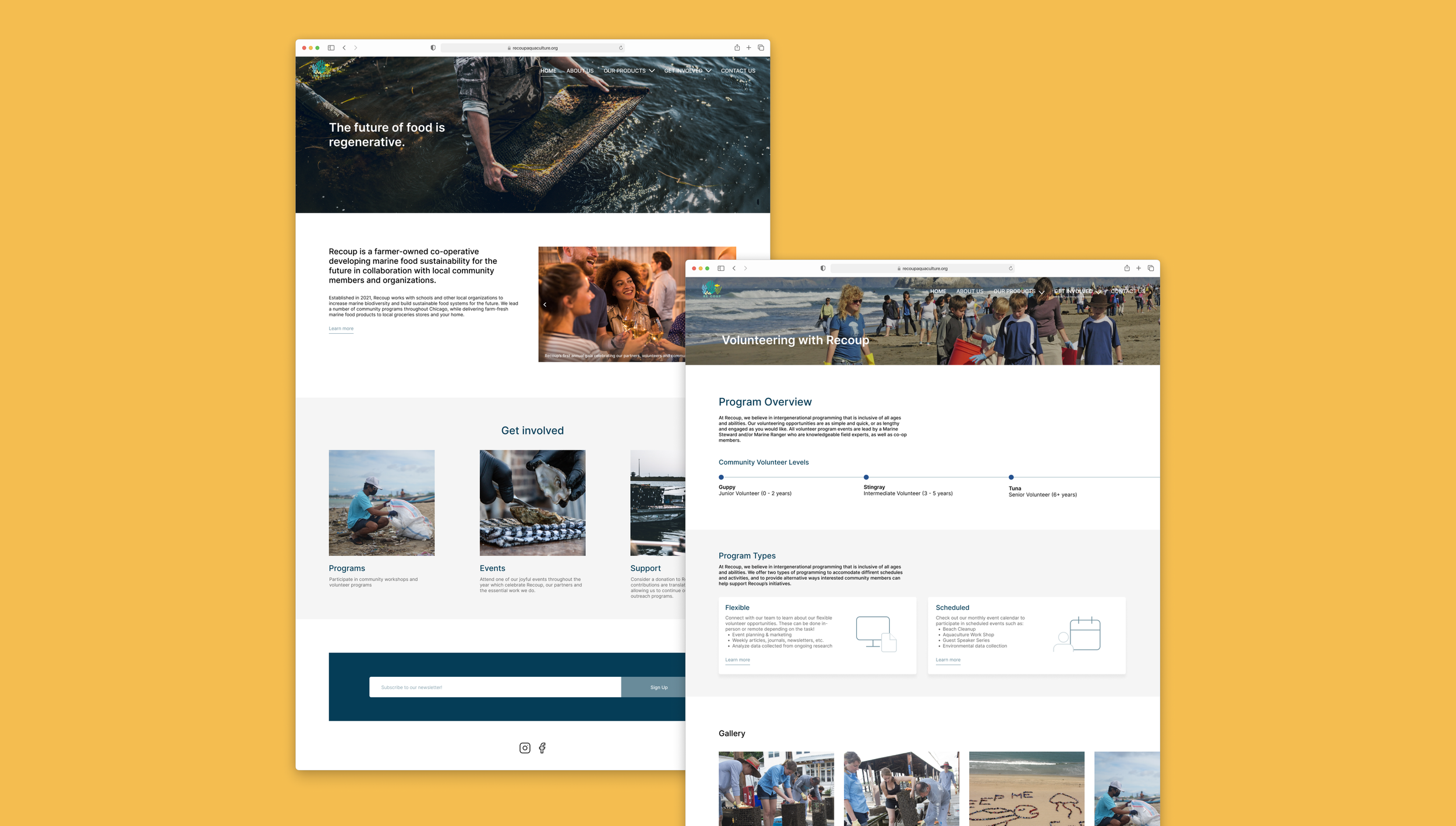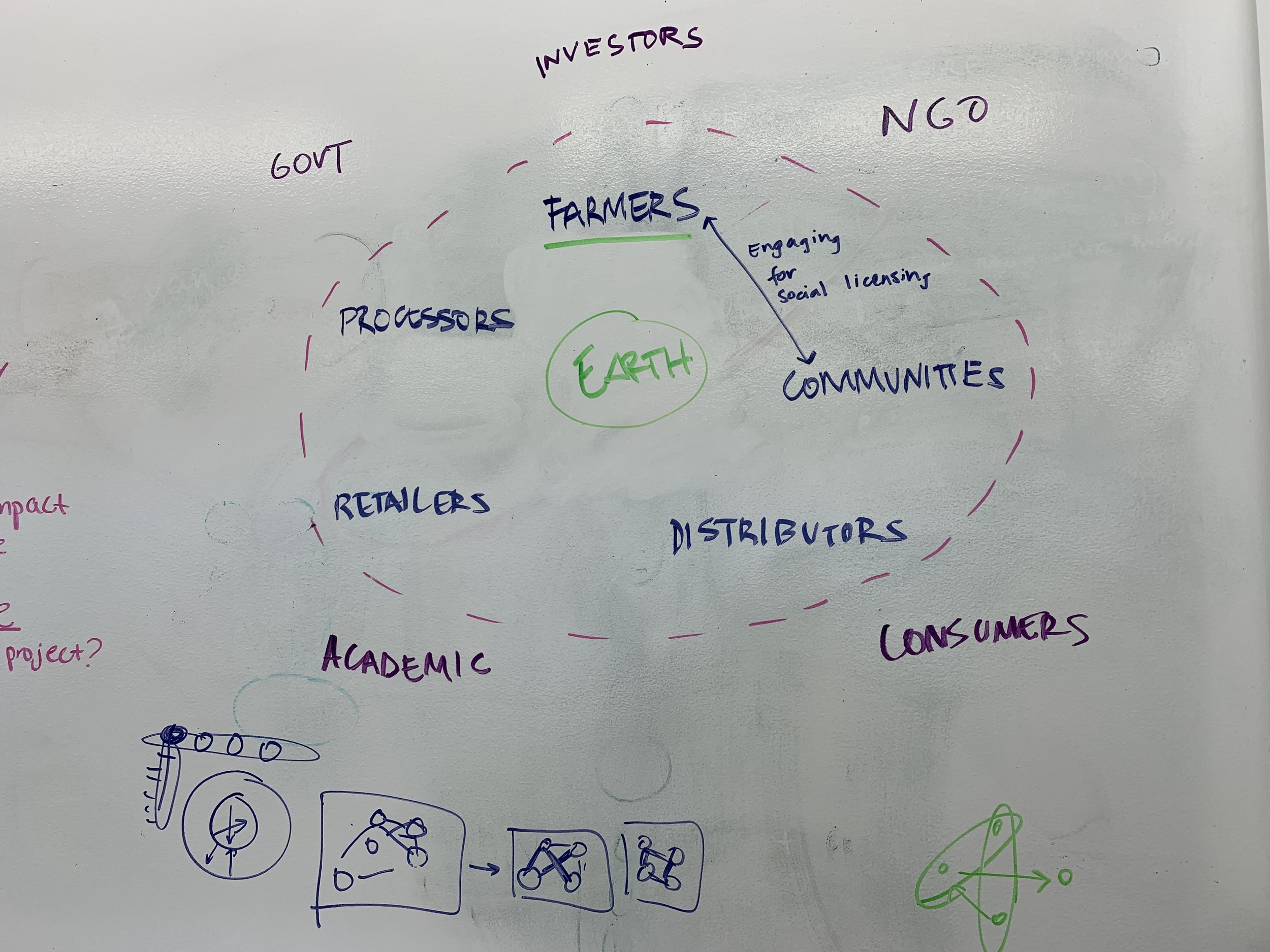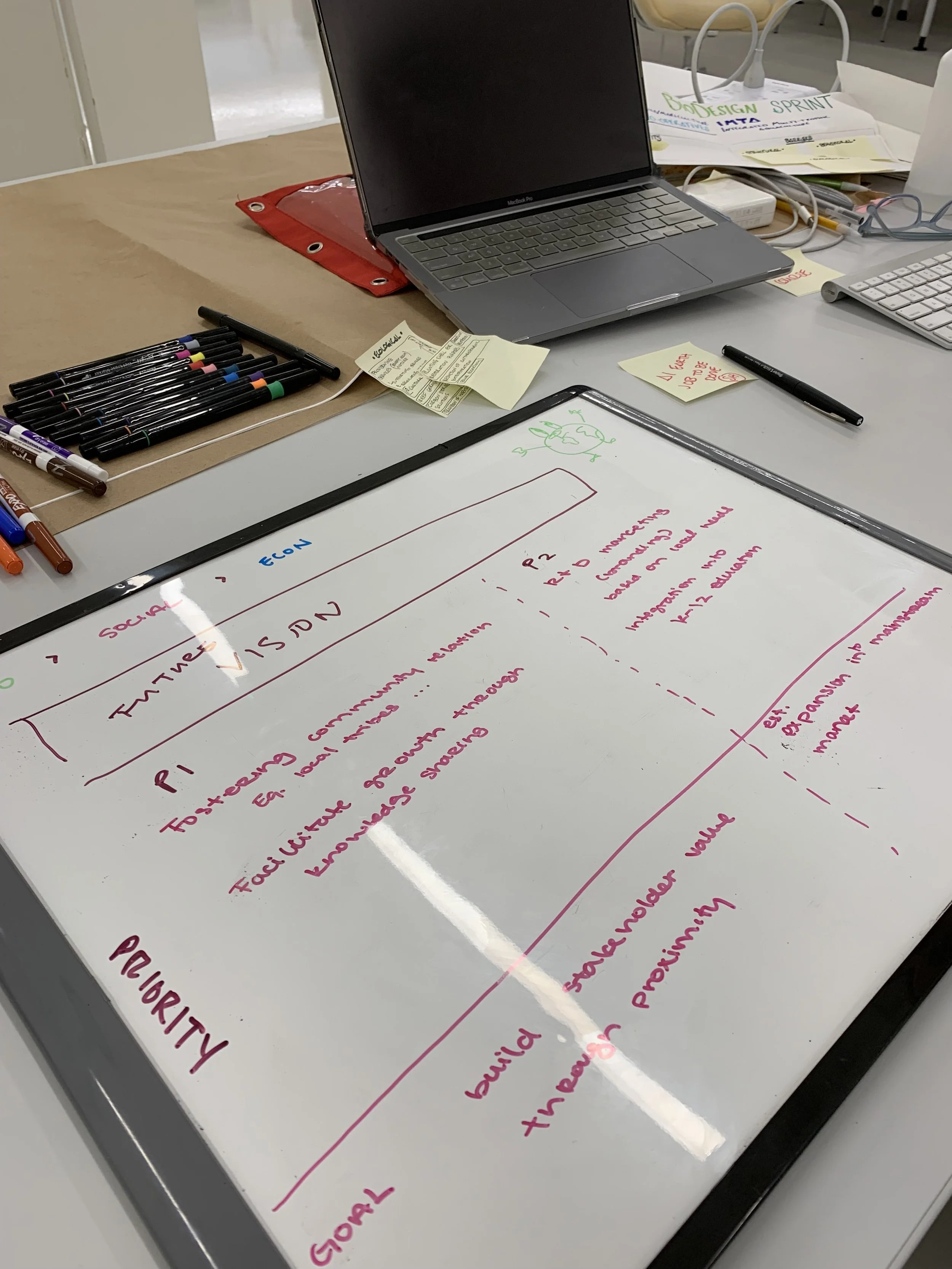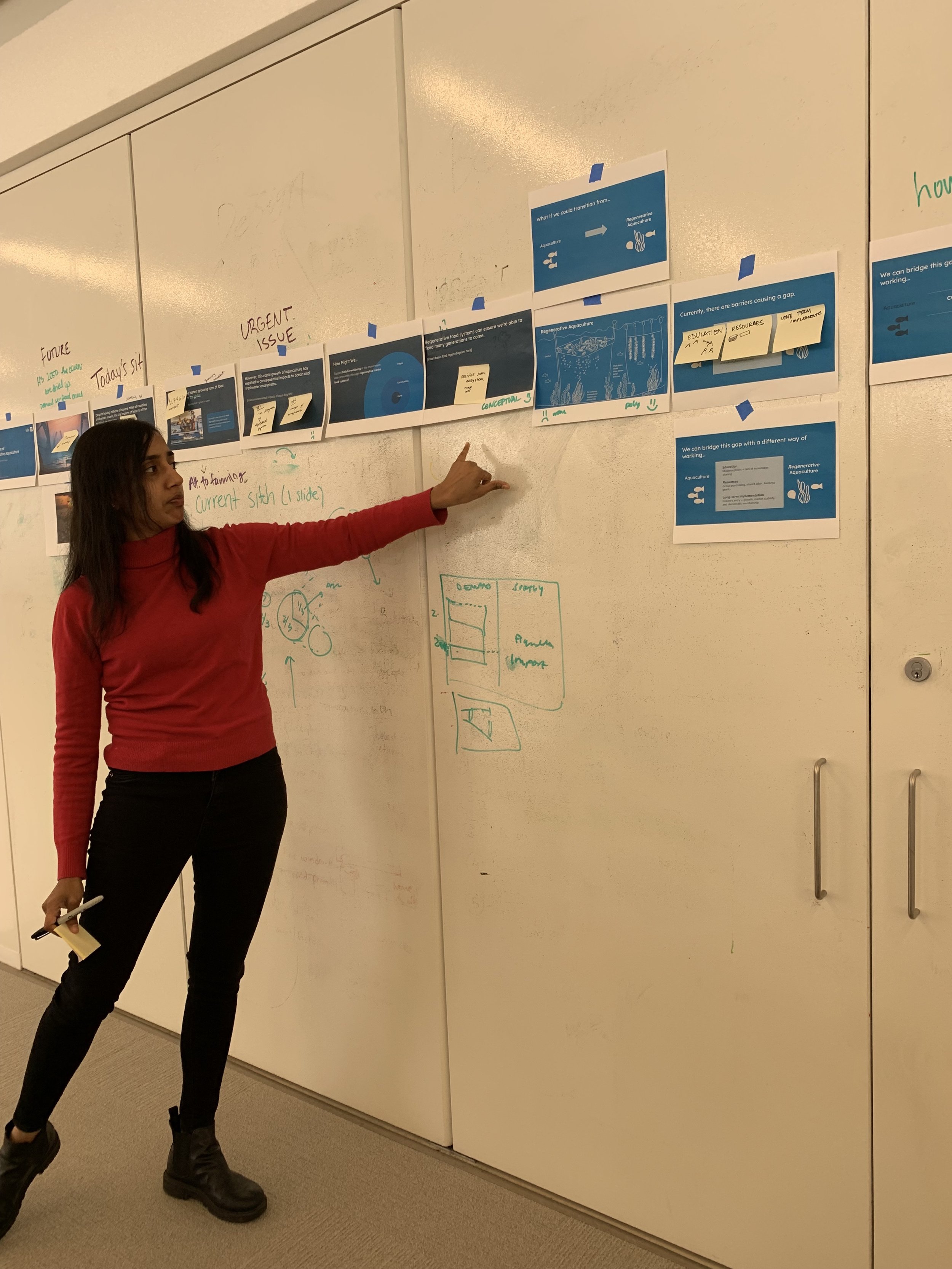
The Future of Aquaculture
Aug 2022 - Dec 2022
This project was submitted to the Biodesign Challenge x Mars Wrigley for the Semi-Finals. The Biodesign Sprint (from Sept 19 - Nov 24) offers anyone with the spark of an idea the opportunity to design a regenerative ecosystem using biology and biotechnology. With a month to develop projects, Sprint participants will gain experience in lightning-fast ideation and product development. Meanwhile, companies—like Mars—can identify and collaborate on novel ideas in biodesign.
Building upon the research and insights gather from the Biodesign challenge, the team explored the concept further and envisioned as future aquaculture co-operative called ‘Recoup’.
Team
Alexandra Zimm, Meghna Prakash, Samira Cohanim
Role
Design Researcher & Strategist
Methods
Behavioral Design, Expert Interviews, Co-design Workshop, Literature Review
Overview
The Challenge
According to the UN Food and Agriculture Organization, "A third of commercial fish stocks are being harvested at biologically unsustainable levels and 90 percent are fully exploited” (National Geographic). With expected increased demand and global population growth by 2050, the existing single-species (mono culture) farming is unsustainable and unhealthy for our ecosystems. If exacerbated by the current trends of overfishing and pollution persist, seafood populations could collapse — which has been defined as 90% depletion (MarineBio). Although some companies like Taylor’s Shellfish raise shellfish in a symbiotic environment, multi-species (regenerative) aquaculture can provide greater biodiversity and yield. However, establishing such a practice is challenging to implement due to the level of skills, knowledge and financial capital required.
Our Solution
ReCoup is an imaginary organization developed to demonstrate a cooperative-approach for establishing regenerative aquaculture systems within the US. Built upon the research conducted and presented for the Biodesign Challenge the team presents potential intergenerational, flexible programming that engages all ages and abilities to develop community awareness and integrated support.
How might Recoup build community engagement for volunteers and locals?
About ReCoup
Established in 2021, ReCoup is a regenerative aquaculture co-op that works with schools and other local organizations to increase marine biodiversity and build sustainable food systems for the future.
ReCoup’s strategic roadmap outlines the milestone goals for transitioning from current monospaces aquaculture systems to regenerative aquaculture by 2050 to mitigate current concerns (on food insecurity and alternative food sources) and market trajectory.
Existing Challenges
Although the US has miles of shorelines along the East and West coast, developing them is a challenge. Limited by the current Federal permitting process — which at one point blocked new permits in Washington state for a 7 year period — also faces pushback from beach-front residents and local tribes.
Organizers engaging with local communities often encounter NIMBY ( ‘Not in My Backyard’) from residents due to a lack of direct and/or visible impact on their lifestyle. Environmental causes often have long-term impact, and lack an immediate, tangible value. Organizations must also navigate a social license be conscious and understanding of the communities they are interacting with.
Current volunteer opportunities are limited
Environmental causes are one of the less popular causes for volunteering (source). To uncover person and social motivations, our team designed a survey and received 25 responses highlighting the challenges of availability, impact and access to opportunities.
Top 5 reasons for not having volunteered before:
Difficult to commit to volunteer schedule
Haven’t had time
Unsure of the value and impact of the work
Don’t know what organization to volunteer for
Volunteer programs too far away
Match interest with engagement levels
In planning educational programming, our team hosted a co-design session to understand how to engage with students of all ages and skill, and lead effectively.
Key insights:
Incentivization: Motivate long-term engagement through visible, social rewards
Inclusivity: Create a sense of belonging or personal investment
Tangible value: View or obtain an immediate, direct impact
Aligning Expectations
Many people are often busy, and finding opportunities can be challenging if one doesn’t know where to look.
Our target persons have an existing interest in environmental causes as a way to gradually increase public interest. Through our interviews and research, it is difficult to ‘convince’ others to join a cause without some personal investment (“why should I care?”).
Developing Aqua’s Core Values
Reliability & Trust
Leveraging the exchange of information and values between volunteers and co-op members to build trust.
Marine Stewards are informed experts who have undergone certification for engaging with the environment, and can provide credible information to leadership and members. On the ground leadership provides meaningful engagement and visibility that the leadership cares, while also referring to the Marine Steward for advice. Looking at the community volunteers, kids can motivate adults by showing interest in a topic and being excited to learn.
Core Value 1:
Inclusivity
Fostering long-term engagement through gamification to create a sense of identity and belonging.
Gamifying experience levels develops opportunities for mentorship, and friendly competition. Age was not a determine factor as a way to leverage youth engagement, as well as create a supportive environment for families participating in activities together.
Core Value 2
Tangible Value
Balancing immediate tangible rewards with long-term social impacts to support an engaging end-to-end volunteer experience.
Using behavioral design methods, the team designed a compelling experiences model — which takes specific user behavior into account at each stage — to ensure that the program was designed from a holistic view. For example, for all phases of the experience to intentionally aim at reducing the likelihood of potential off-ramps, and supporting positive behaviors.
The model also outlines key artifacts and touchpoint during the volunteer’s experience with the program. Physical, visible rewards such as capturing and showcasing events on Instagram or rewarding participants with a certificate of completion and and end of year gala are ways of building community and commitment towards the organization’s goals.
Core Value 3:
Invested Engagement
Designing program agenda that reinforces participation through multi-level engagements internally and externally.
The Simulation Workshop was designed to lower the ‘barrier to entry’ for becoming engaged with the co-op. By partnering with organizations, such as Aquariums, local schools, and NGO community hubs, the workshop creates a baseline educational level that is approachable and scalable to the skill level of participants. Furthermore, to motivate community members to get over the initial hump of engaging and committing to a novel experience, the workshop will touch upon the value of acting by covering successful volunteering and clean up examples from the past, display the tangible benefits for every member.
Celebrating achievements across multiple touchpoint through the volunteer’s experience.
Showcase participation, and impact, through digital touchpoints like social media, the site, and newsletters. While ecological impacts may be harder to see, quantifying impact (ex. amount of trash cleaned at a beach), or highlighting engagement at a workshop can develop a sense of community and investment in ReCoup’s programming.
Core Value 4:
Research Process
Developing the stakeholder map
Synthesizing insights for the strategic roadmap
Preparing for BDC





